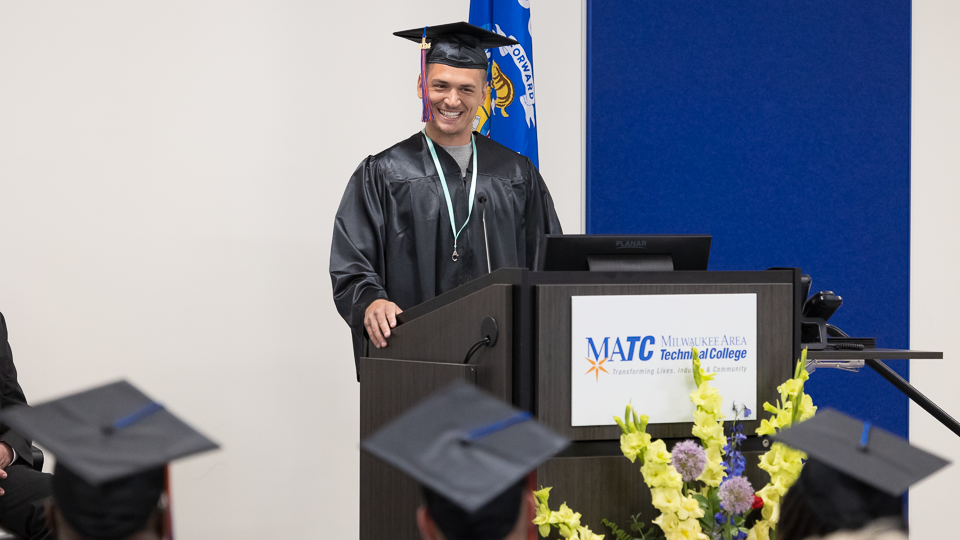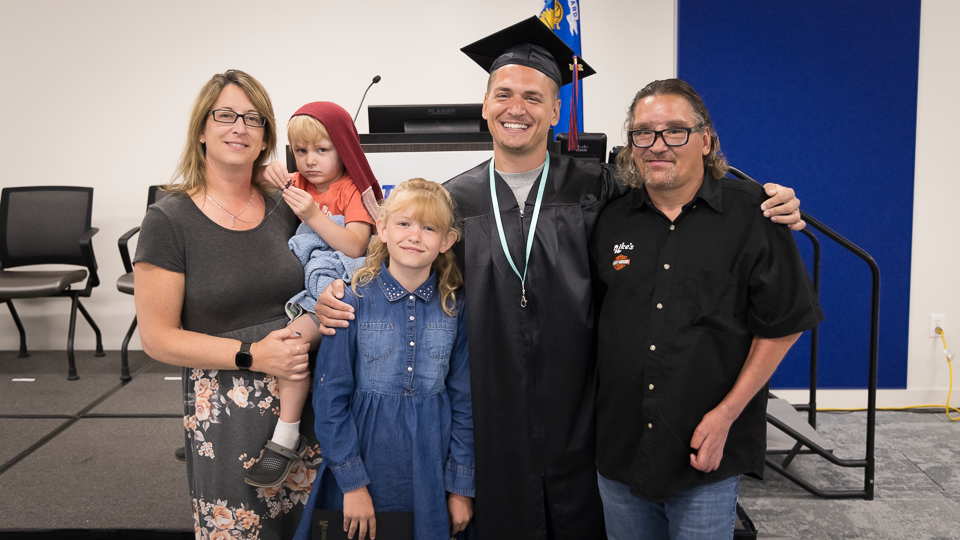
We believe in the power of education and in the power of second chances.
Jacob Pease has had plenty of time to ponder the direction of his life.
Since 2015, he has had a chance to reflect in three state correctional facilities, the Kenosha County Detention Center and the Milwaukee Secure Detention Facility.
“Being incarcerated gives us a chance to look at our lives, to re-evaluate our actions, make a plan to rebuild, and to notice all the other paths we’ve been speeding past,” Pease said.
Earlier this year, he decided to take a different path: He and seven other men in the care of the Wisconsin Department of Corrections attended welding courses taught by Milwaukee Area Technical College instructors.
On Monday, May 20, Pease and the others received welding certificates at a ceremony held at MATC’s Downtown Milwaukee Campus.
“This program has helped turn a negative situation into a positive outcome,” said Pease, who was selected as the student speaker. “Education is one of the most valuable things you can have in life.”
MATC’s Second Chance Pell Grant program provides federal aid to people in state and federal prisons so they can receive postsecondary education while serving their sentences.
In the Welding program, the men took classes six days a week for 16 weeks to earn the 17 credits required to receive the certificate. Once released, the men could return to MATC to further their welding education or use the certificate to secure welding jobs that start at more than $20 an hour.
“The certificate you receive is a stepping stone,” said Wisconsin Department of Corrections Deputy Secretary Jared Hoy, who spoke at the ceremony. “It will make a job more attainable.”
“After you leave, at some point there will be challenges and temptations,” Hoy added. “Think back to this day and remember you met this challenge. Then apply the same mindset to whatever you are confronted with.”
MATC was the first Wisconsin college to participate in the Second Chance program, which was created in 2015. “We thought it was important, and we wanted to be a part of it,” said MATC President Dr. Vicki J. Martin. “We believe in the power of education and in the power of second chances.”
Statistics have shown that participants in the Second Chance program cut their chances of returning to prison almost in half, said Dr. Sadique Isahaku, MATC’s executive dean of academic strategy and innovation and dean of the General Education Academic and Career Pathway.
A 2018 RAND Corporation study showed that inmates who participated in educational programs while in prison had a 48% lower chance of ending up back in prison within three years of release than those who didn’t.
MATC first offered classes to those in care of the state in 2017 and has had eight groups complete courses since then. So far, none of the 140 program participants who have been released has returned to prison, Dr. Isahaku said.
“All the time you spent is an investment, and you will reap the benefits of that investment,” Dr. Isahaku said.
Dr. Isahaku also thanked Dr. Martin, who is retiring this summer after 10 years as MATC president, for her steadfast support of the program. “She is the reason why we are here,” he said.
At the graduation, numerous objects that the participants created during their classes were displayed. The work ranged from flowers to sailboats and a motorcycle, which was created by Pease.
“You will notice welds everywhere and you will judge those welds,” said David Lunz, an MATC Welding instructor. “You are also 100% cooler than anyone who can’t weld.”
Learn about MATC’s Second Chance Pell Grant program
About MATC: Wisconsin’s largest technical college and one of the most diverse two-year institutions in the Midwest, Milwaukee Area Technical College is a key driver of southeastern Wisconsin’s economy and has provided innovative education in the region since 1912. More than 30,000 students per year attend the college’s four campuses and community-based sites or learn online. MATC offers affordable and accessible education and training opportunities that empower and transform lives in the community. The college offers more than 180 academic programs — many that prepare students for jobs immediately upon completion and others that provide transfer options leading to bachelor’s degrees with more than 40 four-year colleges and universities. Overwhelmingly, MATC graduates build careers and businesses in southeastern Wisconsin. The college is accredited by the Higher Learning Commission.

